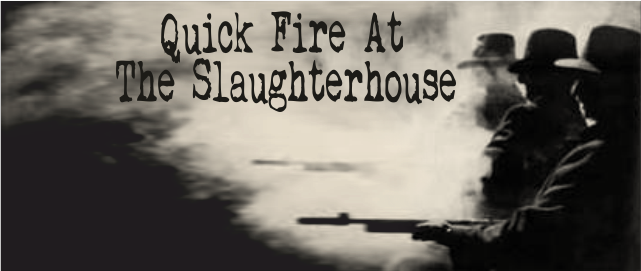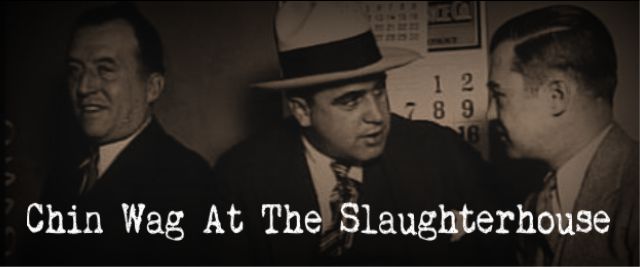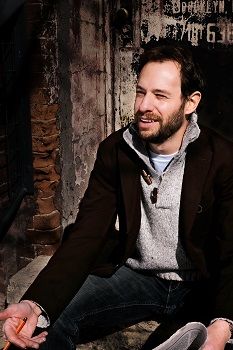
A New Englander by upbringing and inclination, Kenneth Weene is a teacher, psychologist and pastoral counsellor by education. His short stories and poetry have appeared in numerous publications and he is the author of Tales From The Dew Drop Inne. He has a new release, Brooding New Englander. Ken met me at The Slaughterhouse where we talked about juxtapositions in his writing and the frontier in America.
Tell us about Broody New Englander.
 “Broody New Englander” is a collection of three pieces. The first is a novella “The Stylite.” The next two are short stories, “Mothers’ Teat” and “Hansom Dove.” All set in Maine, these are tales of passions, hurts, and angers.
“Broody New Englander” is a collection of three pieces. The first is a novella “The Stylite.” The next two are short stories, “Mothers’ Teat” and “Hansom Dove.” All set in Maine, these are tales of passions, hurts, and angers.
“The Stylite” is poetic in language and set during the second half of the twentieth century. It starts as a simple love story between a want-to-be author, Putnam Williams, and an au pair, Jeannine. Excerpts from Putnam’s single work, a scifi novel, are inserted into the story as it progresses.
Love does not always go smoothly, and the story includes affairs, illness, death, and alienation—all portrayed through a literary pentimento. As the story is revealed one layer at a time, the reader also gets to know the rural community in which it is set and the people who live there.
As we get to know the people, we also learn more about the chickens kept by Jeannine and about the highly intellectualized extraterrestrials in Putnam’s book. The result is an exploration of sexuality, procreation, family, childrearing, social organization, and dealing with death within these three contrasting species. And all the while, the deep brooding emotions of the piece remind us that finding meaning in life is no easy task
Underlying this brooding content is an almost sardonic humor.
“Mothers’ Teat” is set in the same area of Maine but between the two World Wars. It centers on the Scroggs, one dysfunctional farm family and on disappointed love. This short story centers on the women of that difficult world, on the hardness of their lives, at the endless soreness of that teat with which they give nurturance to an ungrateful world. Elizabeth has had enough. She is ready to poison her husband, Humphrey, her method a blackberry rhubarb pie made with the poisonous leaves of the rhubarb. Meanwhile, their oldest daughter, the good and loving Susannah has fallen in love only to have her youthful expectations dashed. At the end, it is Susannah who has possession of the poison pie. To whom will she give it, her abusive father or the man who has so cruelly disappointed her?
The third story, “Hansom Dove,” is set on a small island off the coast of Maine. The time frame is winter during the late twentieth century. An author, Quince Humphrey, is sent, by his agent, to a small inn on the island. This is a horror tale almost gothic in is form. It is designed to leave the reader brooding on the seductive qualities of death.
Taken as a whole, the three pieces share a sense of brooding disquiet and always that sardonic humor lurking underneath.
To what extent do narrative juxtapositions occur in your works and how do they mirror contemporary society?
First, a caveat about literary devices like narrative juxtaposition. I don’t believe in thinking about how to use them when I am writing. I try to write the best yarn I can and make it as effective and affecting as I can. Those literary techniques seem to occur as part of that process not through plan.
Still narrative juxtaposition occurs. Let’s consider “Broody New Englander.” In the first piece, “The Sylite,” for instance I juxtapose the gentle sexuality between Putnam and Jeannine with the rough sex of the chickens that Jeannine raises and then the more abandoned sex of Putnam and his mistress. I think it is the interspersing of the cock and his roughness that allows the reader to catch the difference between Putnam’s two relationships.
Of course, the entirety of “The Stylite” is in some sense a juxtaposition. Humans, chickens, extraterrestrials, and other species are constantly compared and contrasted. In one chapter titled “Marigold and Ash,” the joint topics of the ephemeral, the recurring, and the everlasting are explored. Marigolds, White Ash trees, baseball, berrying, and those extraterrestrials are all woven into this chapter which is entirely narrative juxtaposition.
In the second piece in “Broody New Englander,” “Mothers’ Teat”, the harshness of Humphrey Scoggs is apparent throughout the story in the way he deals with his family, but is that innate to his character or a result of his disappointment with them? The answer comes by comparing his reaction to a cow with an infected teat to the reaction of his neighbor, who cares for the cow in Humphrey’s absence. While the two events are not immediately juxtaposed, they are close enough to make it clear Humphrey is a generally uncaring and angry person.
Similarly, I needed to emphasize Susannah’s sweetness and goodness. That quality is highlighted by her younger sister’s bitterness. Much like their father, Hyacinth offers stark contrast to her sister’s gentleness, which of course intensifies the dramatic force of the final decision Susannah must make, to whom will she give the poison pie.
Do such juxtapositions mirror contemporary society? In a sense not. After all, we live in a world of complexity in which moral certainty has given way to the grayness of relativity. That is probably one reason we like to read and write literature. In a book we are able to see things with a clarity denied us in the real world. Assuredly, Putnam’s sexual behavior was not totally different with the two women and Humphrey cared enough for his cows that they did not all perish. Hyacinth is not the embodiment of evil, and sometimes what we think will last for ever disappears.
My works do not so much mirror modern society as to ask questions about it and about the human condition. Although my next book, “Times to Try the Soul of Man,” which will be out this summer, is very connected to current political issues, especially in the United States, even it is about a larger, more abstract issue. It raises a question about personal responsibility that goes way beyond the current times.
“Broody New Englander” asks us to think about the meaning of life and death. By the constant juxtaposition of those two states of being I am asking the reader to consider how each helps to give meaning to the other. Perhaps even more importantly, I ask if either can have meaning without love, without commitment.
What are you working on at the moment?
I have two projects at the moment and two major commitments at this time.
The first project is the final edits of “Times to Try the Soul of Man,” a crime/coming of age novel which should be out this spring. Based on real events—many of which relatively unknown but quite real—taking place in New York City just before 9/11, this is a tale of corruption at a massive and international scale resulting in a murder. The protagonist, a young reporter who is pretty much a waste-case but with some very unique experiences, is drawn into the events. The story is as much one of his growth and redemption, of his personal journey, as it is the roiling public events.
The second project is “Red and White,” a novel of the Native American experience. Set at the end of the nineteenth century, this novel is the most extensively plotted story I have worked on to date. I am about a fifth of the way into it and really like the way it is shaping up.
Then on an ongoing basis, I am one of the editors of “The Write Room Blog,” a collective effort by thirty-five of us authors from disparate genres and different parts of the world. As with most writers’ blogs, the goal is to garner attention and of course sales. While I cannot speak to sales, I do know we have received way more “hits” than most such blogs.
I am also co-host of “It Matters Radio,” a weekly Internet based show that is live on Thursday evenings ( 9 PM Eastern U.S. time) and then available on podcast. The show does both music and spoken word, and I primarily get to interview our great spoken word guests.
The blog is accessible at http://www.thewriteroomblog.com and the radio show website is http://www.itmattersradio.com
To what extent do you think the frontier is at the heart of the American experience?
When I was a kid, a long time ago, we were taught about the frontier mentality and many thought of 1846 as the quintessential year in American history simply because it was Manifest Destiny writ large. We watched lots of western movies and dreamed of riding the open range.
Of course, by the end of the nineteenth century that geographic frontier was pretty well gone. However, a new challenge had taken the spirit of Americans, the pursuit of wealth. While T.R. pushed Americans to think of a role on the global stage, and Kennedy tried to in a small way return us to the frontier myth by directing our energies to space, the essential challenge for the average American has been creating his/her own personal wealth, be that the small plot of a suburban home or the massive holdings of a mogul. As one of the characters in my upcoming novel “Times to Try the Soul of Man” explains to the protagonist, we are all chasing our piece of the American dream. That dream was the driving force behind the immigration of millions from Europe and continues today as people stream to the states from South America and Asia.
Of course the American experience has always been more complex than just one iconic truth, such as the frontier or the pie. For example, racism is an integral part of the American experience, not only for Black Americans but for the Euro-Americans in whose hearts it festered. You might want to read my essay on race at http://www.thewriteroomblog.com/?p=2651.
Another central truth for Americans has, at least since the mid-twentieth century, been the denial of the trauma of war. “Were number one!” “U.S.A., U.S.A.” We here the chants and see the waving banners at sports events, but the underlying mythology that America must always be the best is, in my opinion as a social scientist, the result of our reaction formation to the trauma of war. We cannot admit the pain and loss of our military excursions. While our veterans may be heroes, those who cannot make it in civilian life, those who are living under bridges and slipping into drugged and drunken oblivion, are ignored. They can’t be real American heroes because “we’re number one.”
Of course the denial of pain and racism fit very nicely back into that “American dream” mythology. Blacks traditionally weren’t entitled to dream; their role was to serve the rest of us. And those who couldn’t make it were derelicts lacking the moral fiber that was so unique to us “real Americans.”
Thank you Kenneth for an informative interview.
 Links:
Links:
‘Broody New Englander’ can be had at Amazon.com and Amazon.co.uk
Find other books by Kenneth Weene at his Amazon author pages, US and UK, and his website.
Follow Ken on Facebook and Twitter @Ken_Weene

 Tell us about The Corpse Role.
Tell us about The Corpse Role.













